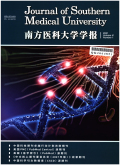南方医科大学学报2024,Vol.44Issue(7):1416-1424,9.DOI:10.12122/j.issn.1673-4254.2024.07.22
芎归汤通过抑制氧化应激诱导的心肌凋亡减轻小鼠心梗后心衰引起的心肌损伤
Xionggui Decoction alleviates heart failure in mice with myocardial infarction by inhibiting oxidative stress-induced cardiomyocyte apoptosis
摘要
Abstract
Objective To explore the protective effect of Xionggui Decoction against cardiac myopathy in a mouse model of heart failure following myocardial infarction(MI)and explore the underlying mechanism.Methods We searched TCMSP,GeneCards,and CTD databases for the targets of active ingredients Xionggui Decoction and heart failure,and the intersecting targets were analyzed with GO and KEGG pathway enrichment analysis using DAVID database.In a mouse model of heart failure following acute MI induced by coronary artery ligation,the cardiac protective effects of 3 g/kg Xionggui Decoction were evaluated by assessing cardiac function,cardiac myopathy and ventricular remodeling of the mice using HE staining,Masson staining,RT-qPCR,and immunohistochemistry.We also tested the effect of Xionggui Decoction at 50 and 100 μg/mL on tert-butylhydrogen peroxide(TBHP)-induced apoptosis of H9C2 cells using CCK8 assay,detection kits for ROS,MDA,SOD,JC-1 and Hoechst 33342/PI staining.Results Network pharmacological analysis identified 62 potential targets of Xionggui Decoction for treatment of heart failure,and the core targets included PTGS2,ESR1,caspase-3,PPARG,HSP90AA1,BCL2,JUN,and GSK3B,which were involved in cell apoptosis and the AGE-RAGE,P53,PI3K-Akt,and VEGF signaling pathways.In the mouse models of heart failure,treatment with Xionggui Decoction significantly alleviated cardiac myopathy and ventricular remodeling,obviously improved heart function of the mice,lowered myocardial expressions of caspase-3 and BAX,and enhanced the expression of BCL2.In H9C2 cells,Xionggui Decoction significantly alleviated TBHP-induced cell apoptosis by inhibiting oxidative stress in the cells.Conclusion Xionggui Decoction can alleviate myocardial injury and improve cardiac function in mice with heart failure following acute MI possibly by inhibiting cardiomyocyte apoptosis induced by oxidative stress.关键词
芎归汤/心力衰竭/网络药理学/细胞凋亡/氧化应激Key words
Xionggui Decoction/heart failure/network pharmacology/apoptosis/oxidative stress引用本文复制引用
任志军,刁建新,王奕婷..芎归汤通过抑制氧化应激诱导的心肌凋亡减轻小鼠心梗后心衰引起的心肌损伤[J].南方医科大学学报,2024,44(7):1416-1424,9.基金项目
广东省自然科学基金(2023A1515011200) (2023A1515011200)

